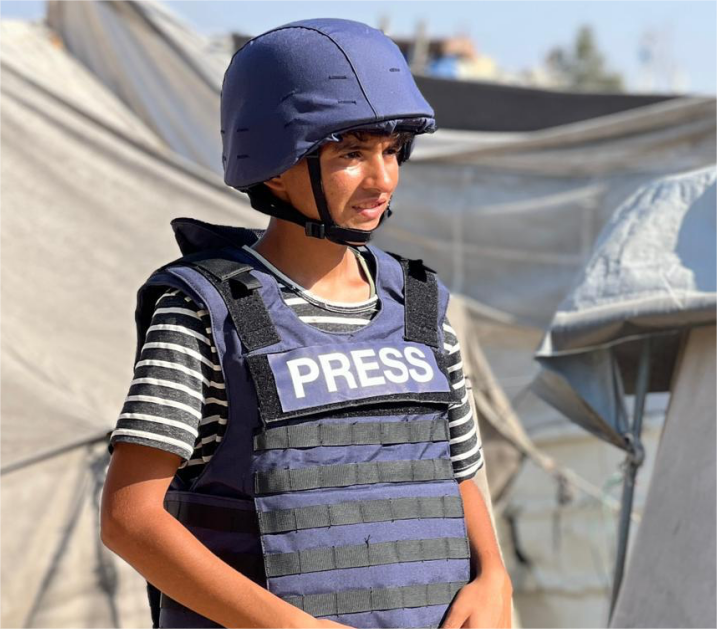Gaza – Hala Eid
Inside his father’s tent, Ahmad al-Masri, the son of the late journalist Hussam al-Masri, sits with tears in his eyes, speaking about his father.
“My father loved his work and was devoted to it. He grew up with a passion for photography since the age of 15, carrying his camera on his shoulders and documenting everything around him. As he grew, so did his dream. He began working with Palestine TV at the age of 19 and quickly proved his talent day by day in filming and production. He was deeply attached to his profession. Even when we urged him to take just one day off, he refused,” Ahmad recalls.
Hussam was not an ordinary journalist. He risked his life to document the war in Gaza, bearing witness to massacres committed by the Israeli occupation and ensuring the voices of Gazans under siege reached the world.
Ahmad continues: “My father was extremely protective of his camera and equipment—more than of himself. Since the beginning of the war, he hardly came home. In two years, we saw him only a handful of times. Even when he was with us, the phone would ring and he would rush out, leaving everything behind for his work. He never hesitated to sacrifice his health or comfort for the truth.”
His mother often begged him to rest: “But he always said: ‘I work and I struggle so I can deliver the message, and so I can provide you with a decent life.’”
Hussam balanced his life between his family and his mission. “I was my father’s companion, always at his side. He taught me photography, and I helped him set up the camera and prepare for broadcasts,” says Ahmad.
Hussam also carried the burden of his wife’s illness—stage four psoriasis—and did everything possible to care for her, searching tirelessly for treatment and hoping to secure her evacuation abroad as her condition deteriorated.
On the night of his death, Ahmad was with him. “I woke up at 6:30 a.m. to set up the camera for broadcast, then went to get some supplies. Suddenly a neighbor told me that the building where my father was filming had been targeted and that he was injured. I rushed to the site and found the building destroyed. I ran back to his tent, but his colleagues were crying. When I asked about him, they said: ‘Your father is gone. May God have mercy on him.’”
Ahmad searched desperately until he found his father in the operating room—already martyred from the first strike, directly targeted as he filmed.
The news shattered the family. “We weren’t ready to lose him. My siblings abroad learned of his martyrdom online and were devastated, denied even a final farewell.”
Now, Ahmad has taken up his father’s belongings—his camera, flak jacket, and helmet—to continue his path. “He gave his life for the truth, and he wanted me to become like him—a symbol of justice. Now the responsibility is mine: to care for my mother and to carry my father’s camera, documenting events and exposing crimes to the world.”
Targeting Journalists at Nasser Medical Complex
Raafat al-Qudra, Director of Palestine TV, described the deadly strike on the al-Yassin building at Nasser Medical Complex in Khan Younis, which killed five journalists.
“When Hussam was hit by the first strike, fellow journalists rushed upstairs to rescue the injured. The camera was still live, broadcasting. Then a second strike targeted journalists, civil defense workers, and medical staff directly. Around 20 people were killed, including five journalists, as well as medics and rescue teams. The massacre was broadcast live before the eyes of the world.”
Al-Qudra stressed: “The targeting of Hussam al-Masri is a huge loss for journalism. But it only strengthens our determination to continue, to walk in the path of the martyrs and expose the truth of Israel’s crimes against the Palestinian people.”
He added: “From the beginning, we knew Palestinian journalists were deliberate targets. Despite their legal protections, the occupation disregards all treaties, laws, and humanity itself. Tragically, the number of journalists killed in this war exceeds those killed in World War I and II combined—more than 246 so far in Gaza’s genocide.”
Al-Qudra appealed to the world: “Do your humanitarian duty. Pressure Israel to stop massacring journalists. These crimes are meant to silence the truth, but they prove how powerful the media is in exposing Israel’s atrocities.”
Hussam al-Masri’s death was not just another casualty—it silenced a voice that had carried the truth to the world despite every obstacle. He was a model of courage, giving his life for the truth and for the innocent.
Yet he left behind a legacy—and a son who now carries his camera, determined to complete the mission.

